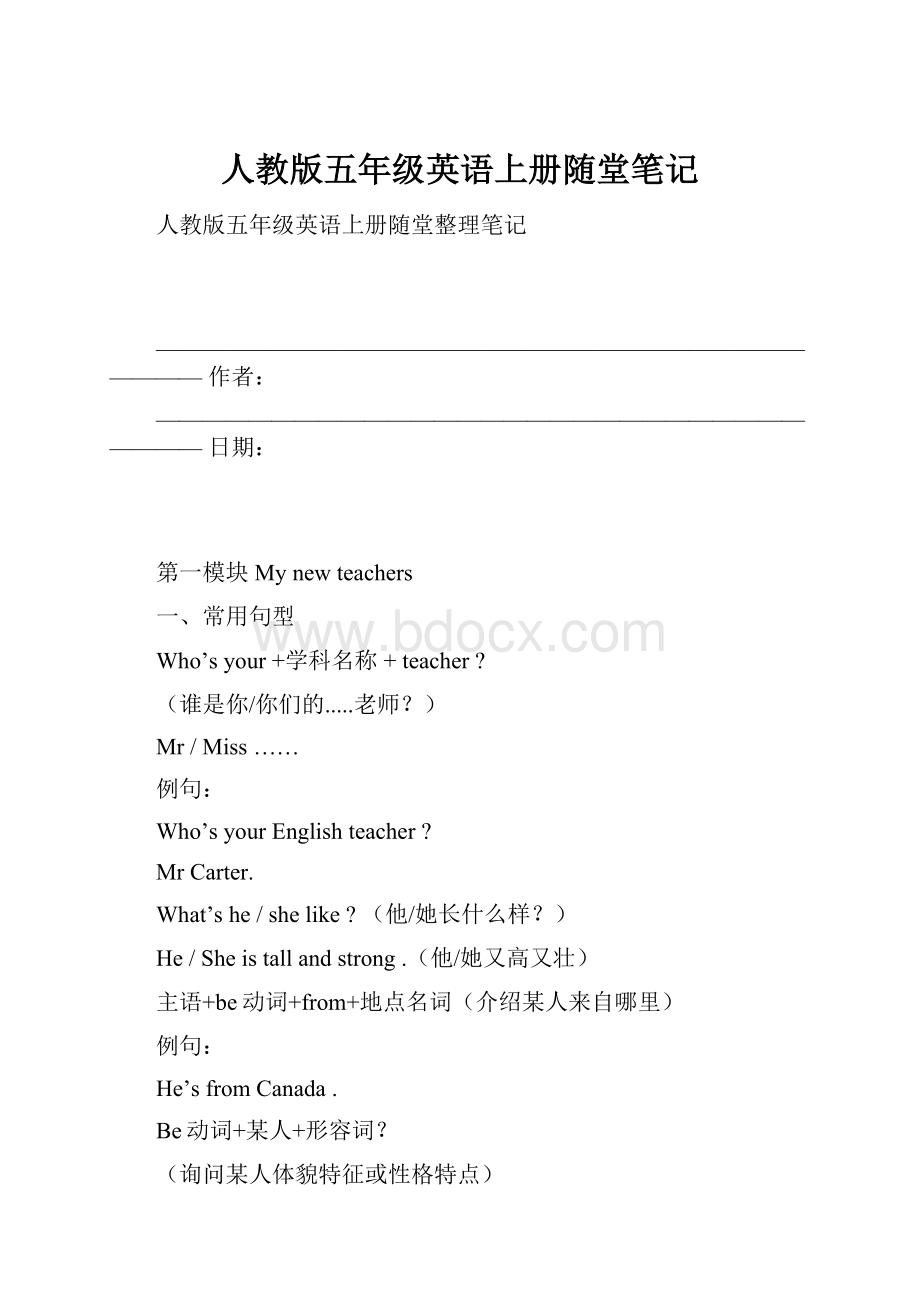人教版五年级英语上册随堂笔记.docx
《人教版五年级英语上册随堂笔记.docx》由会员分享,可在线阅读,更多相关《人教版五年级英语上册随堂笔记.docx(22页珍藏版)》请在冰豆网上搜索。

人教版五年级英语上册随堂笔记
人教版五年级英语上册随堂整理笔记
————————————————————————————————作者:
————————————————————————————————日期:
第一模块Mynewteachers
一、常用句型
Who’syour+学科名称+teacher?
(谁是你/你们的.....老师?
)
Mr/Miss……
例句:
Who’syourEnglishteacher?
MrCarter.
What’she/shelike?
(他/她长什么样?
)
He/Sheistallandstrong.(他/她又高又壮)
主语+be动词+from+地点名词(介绍某人来自哪里)
例句:
He’sfromCanada.
Be动词+某人+形容词?
(询问某人体貌特征或性格特点)
肯定回答:
Yes,主语+be动词。
否定回答:
No,主语+be动词+not。
例句:
Isshequiet?
No,sheisn’t.She’sveryactive.
Isyourprincipalyoung?
No,sheisn’t.She’soldandkind.
二、常用短语
Who’s=WhoisWhat’s=Whatis
He’s=HeisShe’s=Sheis
It’s=Itis
thinandtallyoungandfunny
activeandkindstrictandsmart
tallandstrong
anewmathteacher
befrom…..
lookat
atschool/home
Herclassissomuchfun.
That’sforsure
playfootballafootballplayer
auniversitystudent
You’reright.
Oh,Isee.
Letmetry.Let’splayfootball.
You’regreat!
CanIjoinyou?
Tentothree.Wewon!
三、单词
四会单词:
mathEnglishChineseP.E.artmusicsciencecomputeryoungfunnyfuntallstrongkindoldshortthinMrMisslikemyschoolnewstrictsmartactivequietverybut
fromCanadaknowscienceprincipalladyclassreallyprettycoolguesssuregreatplayershootjoinscore
四、认识单词
have表示“有;吃或喝”,还可以用来描述病情,比如:
Wehaveanewmathteacher.(表示“有”)
Ihavericeandvegetablesforlunch.(表示“吃”)
Hehasacold.(表示“病情”)
想一想:
什么时候用“have”,什么时候用“has”?
this和that:
this是“这;这个”;that是“那;那个”
五、物主代词
我的
你/你们的
他的
她的
它的
我们的
他们的
形容词性物主代词
my
your
his
her
its
our
their
名词性物主代词
mine
yours
his
hers
its
ours
theirs
六、人称代词
人称代词
我
你/你们
他
她
它
我们
他们的
主格
I
you
he
she
it
we
they
宾格
me
you
him
her
it
us
them
第二模块Mydaysoftheweek
一、常用句型
Whatdayisittoday?
It’sWednesday.
WhatdoyouhaveonThursdays?
WehaveEnglish,mathandscienceonThursdays.
想一想,什么时候用“do”,什么时候用“does”
想一想,这个句子和下面的区别:
WhatdoyouhaveforlunchonThursdays?
Ihavetomatoes,tofuandfish.
IlikeMondays,becauseIlikeP.E..
JohnlikesMondays,becausehelikesP.E..
WhatdoyoudoonSaturdays?
IoftenreadbooksandwatchTv.
想一想,什么时候用“do”,什么时候用“does”
Whatdoeshe/she/xiaomingdoonSaturdays?
He/SheoftenreadsbooksandwatchesTv.
Whataboutyou?
Idomyhomework,too.
二、常用短语
metoo
Whataboutyou?
dohomework/housework
dosports
watchTv
readbooks
playcomputergames
playping-pong
getup
playwithyou
That’sgreat!
What’sthematter?
dosomeshopping
onweekends
at7a.m.(at9p.m.)
inthemorning/afternoon/evening
inJanuary、February、March、April、May、June、July、August、September、October、November、December
nextMonday
Wait!
TomorrowisThursday.
It’s8:
00.It’stimetogetup.
It’stimetodoyourhomework.
anewpairofsneakers
aboxofcrayons
Mother’sDayisthesecondSundayinMay.
Father’sDayisthethirdSundayinJune.
Ineedtobuysomenewbooks.
三、单词
四会单词:
Monday=Mon.
Tuesday=Tue.
Wednesday=Wed.
Thursday=Thu.
Friday=Fri.
Saturday=Sat.
Sunday=Sun.
dayhaveontoo
SocialStudies
MoralEducation
yeahwantwinclassbecausewaittomorrowoftenpaintgamesweetlovetimeauntneedenough
第三模块What’syourfavouritefood?
A部分
一、常用句型
Whatwouldyoulike…for……?
I’dlike……
Wouldyoulike…
Yes,please.
No,thanks.
Whatdoyouhavefor……?
Ihave……
第三人称时:
Whatdoeshe/she/ithavefor……?
He/She/Ithas……
二、常用短语
wouldlike
Hereis(=Here’s)ourschoolmenu.
Thatsoundsgood.
forbreakfast/lunch/dinner
onMonday/Tuesday/Wednesday/Thursday/Friday/
Saturday/Sunday
It’stimeforlunch.
三、单词
四会单词:
tofueggplantpotatotomato(greenbeans)
fishforlunchwe
I’dlike=Iwouldlike
porkmuttoncabbagehungryonionmenu
soundheredinnernoodlebeefchicken
sandwichhamburgerice-creamdumplingmeat
hotdog
applepearpeachbananawatermelonorangemilk
四、可数名词和不可数名词
(一)不可数名词:
是指不能用数来计算的名词,一般没有复数形式,比如:
work工作,meat肉,soup汤等等。
(二)可数名词:
是指能用数来计算的名词,有复数形式,比如:
apple苹果,banana香蕉,grape葡萄等等。
单数变复数有以下几种情况:
情况
构成方法
例词
一般情况
在词尾+s
map----maps
bag----bags
boy----boys
girl----girls
以s,sh,ch,x结尾的词
在词尾+es
watch----watches
bus----buses
以辅音字母+y结尾的词
先变y为i,再加es
family----families
boy为什么不能变?
以f或fe结尾的词
先变f或fe为v,再加es
knife----knives
wife----wives
不规则可数名词
man----men
woman----women
tooth----teeth
child---children
备注:
英语26个字母中,a,e,i,o,u是元音字母,其余全是辅音字母。
B部分
一、常用句型
(一)如何描述食物的味道
食物名称+be动词+形容词,如:
Theapplesaresweet.
Itistasty.
(二)询问对方最喜欢的事物
What’syourfavourite……?
Ilike……
或者:
Myfavourite…..is……
二、常用短语
What’syourfavourite……?
Ilike……
metoo
Whataboutyou?
Ilikefruit.ButIdon’tlikegrapes.Theyaresour.
Ilikeapples.Becausethey’resweet.
Welikebeef.Becauseit’stasty.
Mypartnerlikestofu.Becauseit’shealthy.
I’mheavynow.Ihavetoeatvegetables.
inaboat
onthefloor
gotoarestaurant
havenoodles
Helpyourselftosomefruit.
三、单词
四会单词:
saltysweetsourtastyfreshfavourite
grapefruitrice
they’re=theyare
don’t=donot
I’m=Iam
toosalty
healthyyummyfoodvegetablenoweat
heavy
haveto
carrotjuice
复习一
一、常用句型
CanIinterviewyoufortheschoolnewspaper?
Yes,certainly.
Thankyouverymuch!
Youarewelcome!
二、常用短语
eatice-cream
fastfood
Mondayisagreatday!
SometimesIgotoGrandma’stoplay.
HowIloveSaturday!
study/playviolin
Tellmeaboutyourschool.
WhichlunchisJack’s?
三、单词
certainlyinterviewnewspaperice-creamgrandmagrandpasometimesstudyviolinusuallycarrotcucumberchickenhamburgersaladwhy
第四模块Whatcanyoudo?
A部分
一、常用句型
Whatcanyoudo?
Ican……
Canyou…..?
Yes,Ican.
No,Ican’t.
Areyouhelpfulathome?
Sure!
二、常用短语
sweepthefloor
cookthemeals
cleanthebedroom/classroom
watertheflowers
emptythetrash
washtheclothes
washthewindows
athome
Great!
Youarehelpful!
justdoit!
runafteryou
hideintheshoe
三、单词
eatbamboomousedrawanimalzoo
sweepcleanhelpfulill
B部分
一、常用句型
Canyou…..?
Yes,Ican.
No,Ican’t.
Iwouldliketo+动词原形
二、常用短语
washtheclothes
dohousework
setthetable
makethebed
dothedishes
putawaytheclothes
watertheplants
Notimetodance
Andthereismore.
Oh,please!
Nomore!
I’dliketo+动词原形=Iwouldliketo+动词原形
haveatry/rest/fever/cold
playchess
useacomputer
letmesee
Waitaminute
remembertoswitchoffthegas
pickoutthebatteries
rinseoffthedetergent
separatethecolouredclothesfromthewhiteones
三、单词
moreplantdancerobotrememberswitchgaspickbatteryrinsedetergentseparatecount
can’t=cannot
第五模块Mynewroom
A部分
一、常用句型
Thereis……单数名词或不可数名词(=There’s……)
Thereare……复数名词(=There’re……)
例如:
Thereisabigclosetandtwonewmirrors.
Therearemanystory-books.
Isthereatableinyourbedroom?
Ihaveanewtrashbin,
Isthisyourbedroom?
Yes,itis.
No,itisn’t.
What’sitlike?
二、常用短语
Pleasehelpyourself.
Helpyourselftosome……
Comeandlookatmynewcurtains.
onabigfarm
onthebed
ontheshelf
onthewall
ontheendtable
inmyroom
myownroom
verymuch
onthefirst/second/thirdfloor
三、单词
curtainclosetfullmirrorbedroombathroomkitchen
livingroom
endtable
lookat
trashbin
farmbigtreeunderhouseseegarbageemptyterrificair-conditionercooldollmanystory-bookshelfwallphonenutwhichownrabbitflatthird
B部分
一、常用句型
Whereisthetrashbin?
It’snearthetable.
Wherearemybooks?
They’reontheendtable.
Where’syourhome?
Thisisapictureofmyroom.
二、常用短语
Whatcanyouseeoverthebed?
Canyoutellmemore?
workwithit
gohome
nearthetable/desk
behindthedoor
overthebed
infrontofus
三、单词
inonoverunderbehindnearbesideclothes
infrontof
wherefindmistaketoysofapictureshelfdoortellworkmanyofdifferencehatsnakeapartmentflathotelcabinhouse
四、所属关系表示
(一)of表示“……的”,用来表示无生命事物的所属关系。
例如:
apictureofmyroom
thelegsofthedesk
(二)’s也表示“……的”,是名词所有格的一种形式,用来表示有生命的人或动物的所属关系。
一般在名词词尾加“’s”,以s结尾的复数名词只在词尾加“’s”。
例如:
Tom’sbike
Thegirls’books
C部分
一、常用句型
Canyoufindthedifferences?
Canyouhelpme?
helpsb(to)dosth
例句:
Ioftenhelpmymotherdothehousework.
Where’s(=Whereis)yourhome?
wanttodosth=wouldliketodosth
例句:
Iwanttogohome.
二、常用短语
awarmspringmorning
Ihavenotime.
Ihavetohurry.
Iambusy,too.
It’stimeforschool.
Walkalongtheriverbank
pushhimintotheriver
三、单词
differenceskirtshirtapartmentflathotelcabinhousebesidewarmhurrywindspringkickblowsurpriseturtlepushriverbankalong
beercan
第六模块Mynewroom
A部分
一、常用句型
询问某地是否有某物的句型
(一):
Isthere……in/on/near/behind/over/under/beside……?
Yes,thereis.
No,thereisn’t.
例句:
Isthereaforestinthepark?
Yes,thereis.
No,thereisn’t.
询问某地是否有某物的句型
(二):
Arethere….in/on/near/behind/over/under/beside…?
Yes,thereare.
No,therearen’t.
例句:
Arethereanypandasinthemountains?
Yes,thereare.
No,therearen’t.
二、常用短语
Isthereaforestinthepark?
Isthereariver?
overthere
inthevillage
inthecity
inthepark
intheschool
athome
Look!
Thisismyholidaypicture.
It’spretty.
It’sveryfar.
cometothenaturepark
lookatthemap
useatelescopetowatchthedistantplace
sitontheground
havenowater
三、单词
villagepathparkhereriverlakeskycloudflowergrassforestmountainfarmpicturephoto
naturepark
blowflowchildrenanimalmapusetelescopewatchdistantplacesitgroundfarholiday
四、“therebe”句型转换
“therebe”句型是指“thereis/are……”句型,意思是“在某地有某物”。
“therebe”句型中,句子的主语是be动词后的名词或名词短语。
(一)对“therebe”句型句子的主语进行提问时,句型用“Whatis+方位介词短语”
例句:
对划线部分提问
Thereisabirdinthetr